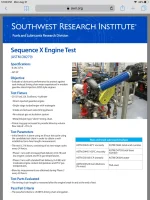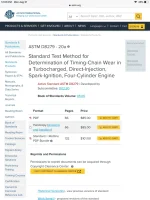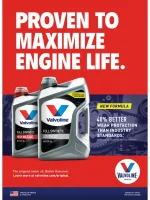You are using an out of date browser. It may not display this or other websites correctly.
You should upgrade or use an alternative browser.
You should upgrade or use an alternative browser.
ILSAC GF6 Chain Wear Test
- Thread starter Snagglefoot
- Start date
- Status
- Not open for further replies.
Are timing belts excluded from AP6 , since lot of 4 bangers have timing belts nowadays
Are timing belts excluded from AP6 , since lot of 4 bangers have timing belts nowadays
timing belts are replaced at regular intervals and aren't as hard on oil as a timing chain
Piston ring gap increased so blow by flow is 70 L /min.
Seems like quite a lot of blow by imo.
Seems like quite a lot of blow by imo.
Are timing belts excluded from AP6 , since lot of 4 bangers have timing belts nowadays
Chains are the majority these days. Not sure why a oil spec would apply to timing belts.
Chains are the majority these days. Not sure why a oil spec would apply to timing belts.
It could effect a wet belt like the Ford 1.0 Ecoboost. I assume Ford WSS-M2C948-B has some sort of requirement for belt compatibility.
So, for those like me, can someone explain if SP/GF6 is better than SN/GF5? And if yes, is it a measurable improvement?
According to the article (and spider chart) the new GF-6 is better than the old GF-5.
https://www.motorindiaonline.in/gue...cation-almost-a-decade-in-the-making-is-here/
It could effect a wet belt like the Ford 1.0 Ecoboost. I assume Ford WSS-M2C948-B has some sort of requirement for belt compatibility.
I guess Ford had a better idea. The vast majority of belts don’t get lubricated that way.
Honda outdoor power equipment has had the wet belt OHC for decades.
Most 4 cylinders have went away from timing belts? Whose still make a 4 cylinder with a timing belt? Atleast all of mine have chains.Are timing belts excluded from AP6 , since lot of 4 bangers have timing belts nowadays
oh wow, that's impressive. Thx for sharing!According to the article (and spider chart) the new GF-6 is better than the old GF-5.
https://www.motorindiaonline.in/gue...cation-almost-a-decade-in-the-making-is-here/
- Joined
- Dec 30, 2006
- Messages
- 29,558
I like this part where he says:
Thinning engine oils is an ongoing trend because of the fuel economy advancements. However, this inclination causes some concerns. Temperature’s effect on viscosity is well documented. At operating temperatures, the engine is protected from friction and wear by a thin oil film. However, if overheating occurs, the thin oil film will degrade and could conceivably result in devastating wear to the engine. Another disadvantage of thinner oils is that abrasive soot and wears debris particulate matter, equal to or greater than the thickness of the oil film, will cause wear4. This underscores the importance of oil filters to prevent wear debris from entering the oil film. As the thin oil trend continues, ILSAC GF-6 must implement standards which balance both engine performance and robustness.
This further proves thicker oils protect better and thinner oils are for fuel economy only.
Thinning engine oils is an ongoing trend because of the fuel economy advancements. However, this inclination causes some concerns. Temperature’s effect on viscosity is well documented. At operating temperatures, the engine is protected from friction and wear by a thin oil film. However, if overheating occurs, the thin oil film will degrade and could conceivably result in devastating wear to the engine. Another disadvantage of thinner oils is that abrasive soot and wears debris particulate matter, equal to or greater than the thickness of the oil film, will cause wear4. This underscores the importance of oil filters to prevent wear debris from entering the oil film. As the thin oil trend continues, ILSAC GF-6 must implement standards which balance both engine performance and robustness.
This further proves thicker oils protect better and thinner oils are for fuel economy only.
Snagglefoot
Thread starter
Keep in mind this is the opinion of a couple of guys writing in a Indian magazine. It is not necessarily the opinion of the ASTM or API. They didn’t “prove” anything.I like this part where he says:
Thinning engine oils is an ongoing trend because of the fuel economy advancements. However, this inclination causes some concerns. Temperature’s effect on viscosity is well documented. At operating temperatures, the engine is protected from friction and wear by a thin oil film. However, if overheating occurs, the thin oil film will degrade and could conceivably result in devastating wear to the engine. Another disadvantage of thinner oils is that abrasive soot and wears debris particulate matter, equal to or greater than the thickness of the oil film, will cause wear4. This underscores the importance of oil filters to prevent wear debris from entering the oil film. As the thin oil trend continues, ILSAC GF-6 must implement standards which balance both engine performance and robustness.
This further proves thicker oils protect better and thinner oils are for fuel economy only.
D
Deleted member 89374
I like this part where he says:
Thinning engine oils is an ongoing trend because of the fuel economy advancements. However, this inclination causes some concerns. Temperature’s effect on viscosity is well documented. At operating temperatures, the engine is protected from friction and wear by a thin oil film. However, if overheating occurs, the thin oil film will degrade and could conceivably result in devastating wear to the engine. Another disadvantage of thinner oils is that abrasive soot and wears debris particulate matter, equal to or greater than the thickness of the oil film, will cause wear4. This underscores the importance of oil filters to prevent wear debris from entering the oil film. As the thin oil trend continues, ILSAC GF-6 must implement standards which balance both engine performance and robustness.
This further proves thicker oils protect better and thinner oils are for fuel economy only.
I really don't understand this trend in thinning oils. At this point, it is going on worldwide, not just in the US. Although Europe has a more sane classification system and also offers the option of having higher-performing motor oils like ACEA A3.
I live in a hotter climate, and oil temperature reaches 224F just while cruising down the freeway in my pickup truck. I tried fuel economy with 5W-20 (Pennzoil YB from the dealer and Castrol EDGE EP 5W-20). Currently, I'm running Mobil 1 FS 0W-40 and I'm getting 15 city, 22.5 Highway, and 18 MPG combined. That's with a light foot though. I always disable MDS as I have yet to see any positive impact. I did not get a better fuel economy using any 5W-20 oil.
I believe that there is more to this trend than just fuel economy, which IMHO is a bunch of BS. Anti-wear additives like ZDDP are also being lowered. I think the real reason is to try and pollute less (this has to be proven yet) and to help the automotive industry change and "improve". Engine designs change and these newer oils work with them, however, older engines are left behind and will wear out even faster on thinner oils with fewer additives in them.
When you go to your local Walmart you notice the isles full of High Mileage motor oils. It says "For vehicles with 75,000 miles or higher". It might as well say "use it if your vehicle is out of warranty". These High Mileage motor oils have higher viscosity at operating temperature than their normal counterparts and more anti-wear additives and friction modifiers. Then why aren't regular motor oils formulated the same way? It is ridiculous, indeed.
No worries, ACEA A3 oils are slowly but surely joining the party as well, because they have become more shear prone and with every iteration, they are becoming thinner at the same viscosity rating. Just look up the latest PDS for Castrol EDGE 5W-40 ACEA A3/B4. It's 69 cSt@40 & 12.9 cSt@100.
All my vehicles have motors that are ancient designs by today's standards. I switched to slightly thicker oils with a hair more additives in them so I can keep them for many many years to come. I'm these new motor oils work better in more modern engines. I don't trust their backward compatibility claims.
Also, why can't the Sequence IIIH test be done on a GDI engine, like a lovely Hyundai Lambda II motor or even better, a TGDI like a Ford 3.5 EcoBoost? I'd really like to see the results of that test. Let's stop the BS train and perform tests that are down to earth and grounded in reality, not to fit the criteria that these organizations are looking for. In real life, if you short trip one of these TGDI engines and you go 10,000 miles or more without changing your oil you will wear out the engine prematurely and deal with polymerized deposits and whatnot.
Just my two cents. Maybe I'm wrong, however, I hope I'm not. It's disappointing, to say the least, that the decisions of others end costing us money in repairs or vehicle replacement down the line.
Piston ring gap increased so blow by flow is 70 L /min.
Seems like quite a lot of blow by imo.
Not surprising at all considering how auto manufacturers are having to go out of their way to meet the ever increasing environmentalist regulations for carbon emissions.
If more of what would have previously gone out the tailpipe now ends up, by way of blow by, in the crankcase it is a win in the minds of the environmentalists and thus the auto manufacturers. That being said it creates additional maintenance concerns for the consumer especially over the long term.
Snagglefoot
Thread starter
Blow-by is real. Check the posts about catch cans and why guys are running them.
D
Deleted member 89374
Blow-by is real. Check the posts about catch cans and why guys are running them.
And the addition of a PCV valve and a hose that puts that crud back into the intake was a genius invention. Add to that GDI and you no longer wonder how parts & car manufacturers stay in business while we can never own anything that lasts.
And the addition of a PCV valve and a hose that puts that crud back into the intake was a genius invention. Add to that GDI and you no longer wonder how parts & car manufacturers stay in business while we can never own anything that lasts.
The PCV has been around for over 50 years. There is no conspiracy here.
- Status
- Not open for further replies.
Similar threads
- Sticky
- Replies
- 1
- Views
- 3K
- Replies
- 28
- Views
- 4K
- Sticky
- Replies
- 2
- Views
- 1K
- Replies
- 6
- Views
- 548
- Replies
- 524
- Views
- 36K




